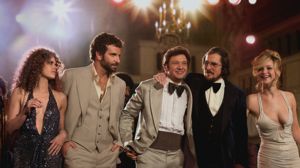David O. Russell's American Hustle opens with a scene in which Christian Bale, playing conman Irving Rosenfeld, laboriously styles an impressive combover designed by you. This ritual is clearly part of his warm-up before a con, his way of building up his own confidence before working on a mark's. We're never really sure if he thinks he's fooling anyone - that bald spot is just too big to hide - but that's kind of the point. As an audience, we're being set up for the long con, never sure when someone is genuine or not, and whether they know we know they're being genuine or not. That's both the fun and frustration of American Hustle.
Set in late 70s New York, American Hustle is a sort-of-true, sort-of-made-up (an introductory title card playfully states "Some of this actually happened.") tale inspired by the real FBI "Abscam" sting operation. Rosenfeld, a glass salesman/dry-cleaning owner/conman, specializes in duping desperate people into paying him advances on loans that don't exist. It's a disco-era version of today's email scams except his partner, Sydney Prosser (Amy Adams), pretends to be a British bank executive instead of a deposed Nigerian prince. The trick to making people want to give you their money, Rosenfeld says, is to say "No" over and over. The more you say it, the more they want to give you their money.
When someone finally does says no back to them, it's FBI agent Richie DiMaso (Bradley Cooper), who uses the threat of jail time to force Rosenfeld and Prosser into working for him, using their skills to catch bigger fish. Obsessed with making a name for himself in the bureau, DiMaso keeps upping the ante, from small time hoods to local congressmen state senators, and even the Mafia. Pulled into this is Camden, New Jersey mayor Carmine Polito (Jeremy Renner) and Rosenfeld's wife Rosalyn (Jennifer Lawrence).
But back to the hair. Everyone has been given their own, special, character-driven do. DiMaso, desperate to keep control of his life and career, wears a tight perm. Prosser's wavy curls convey the elegance she wishes she had. Polito's Elvis-style pompadour marks him as a man of the people. Rosalyn's jumbled tresses are indicative of her character's instability.
I know all that sounds a little simplistic, like a rushed first-year film theory paper. The characters of American Hustle are more subtly defined than that. Mostly. For all the backstory Russell and writer Eric Singer have given their characters, for all the multiple voice-overs employed to earn our sympathies, they are quick to abandon character consistency when it suits a given moment. This is especially for Cooper and Lawrence. The main directorial note given to both of them seems to have been "Crazy!" The result is two characters with no internal logic, who act in ways that don't make sense from scene to scene. Motivations are vague or completely absent, creating confusion when clarity is needed. Add to that Russell's love of actors yelling at each other in Long Island accents, and American Hustle has too many scenes that feel like acting workshops more than character moments. (Lawrence, who does solid work with what she has, is hung out to dry a few times).
Thankfully more of American Hustle works than doesn't. As Rosenfeld, Bale takes a physically ridiculous figure and gives him real depth and the film its centre. Adams gives Prosser the right combination of sadness, sexiness, and neediness. Renner's Polito earns the most sympathy as a man a little toowilling to compromise his ethics for the benefit of his constituents. And although it may owe a little too much to Martin Scorsese's Goodfellas, Russell's more-is-more approach to acting, editing, and, well, everything, means that if one scene doesn't work, something completely different isn't too far away. You just have to try and forget all the scenes that don't work, which I couldn't.
And in a movie about the con -- the ones we play on ourselves as well as others - everything needs to hold together as the credits roll. It all needs to make sense in the rear view, so you walk away believing. As hard as it works to keep everything in place, American Hustle ends with enough loose strands that it looks a little too thrown together instead of what it wants to be: elegant.
Just trying to keep everything in place,
Casey







